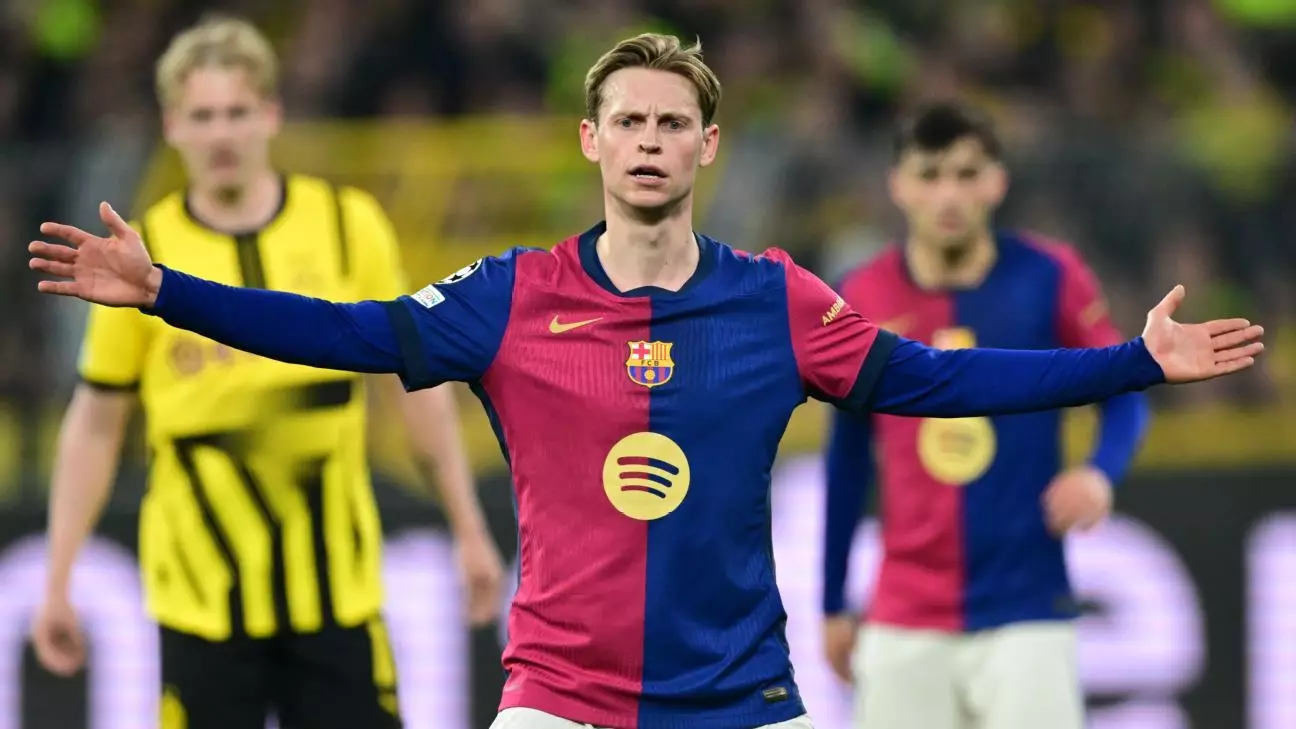Barcelona’s journey in the UEFA Champions League took a tumultuous turn during their recent match against Borussia Dortmund. Despite securing a place in the semifinals—a feat not achieved since 2019—the players showcased a mixed bag of emotions, battling between excitement and disappointment after suffering a 3-1 defeat. Serhou Guirassy, the new leading scorer of the tournament, put on an impressive performance, netting a hat-trick that, paradoxically, revealed Barcelona’s vulnerability. The sheer contrast between their earlier commanding 4-0 victory in the first leg and this nail-biting return leg serves as a critical reminder that complacency can easily creep into even the most disciplined squads.
Fortress Without Walls
In sports, confidence can be a double-edged sword. A 4-0 lead might lead one to believe that a team can relax and play on auto-pilot, but Barcelona found themselves caught in a precarious situation as Dortmund surged forward with relentless energy. The anticipation of an easy path to the semifinals quickly vaporized, replaced by the haunting specter of past humiliations against teams like AS Roma and Liverpool. Fortunately for Barcelona, they managed to cling to a 5-3 aggregate win, but the cracks in their once-bulletproof defense raised alarms about their readiness for bigger challenges ahead. The psychological impact of letting a team claw back significantly into a tie cannot be understated, as it breeds doubt that can linger long after the final whistle.
Between Expectations and Reality
Coach Hansi Flick captured this very essence post-match when he observed that the mood in the dressing room was less celebratory and more reflective. It is a unique position to be in—having advanced to the next round, yet feeling the weight of unfulfilled potential. This dichotomy illustrates Barcelona’s renewed ambition, tempered by the harsh reality of their performance in Dortmund. The players expected a result consistent with their newfound status, leading to a sense of disappointment despite their advancement. Flick’s approach to shift focus away from negativity towards the broader narrative—the overall successes of the season—did show a keen understanding of team psychology.
The Road Ahead
Looking forward, Barcelona will confront heightened expectations as they face off against either Bayern Munich or Inter Milan in the upcoming semifinals. These tests will be crucial in determining if they truly have risen from the shadows of Euro obscurity or if they still need more time to fuse talent with tactical acumen. In La Liga, they hold a precarious four-point lead, and with a Copa del Rey final against their archrivals Real Madrid looming, the necessity to regain form and unity is paramount. The upcoming fixtures provide an opportunity for the squad to both learn from this Dortmund affair and assert their dominance.
Emerging Talents and Growing Pains
One cannot ignore the contributions of standout players like Raphinha, Robert Lewandowski, and Lamine Yamal, who collectively have provided Barcelona with the attacking firepower needed to shine this season. Their extraordinary goalscoring feats stand testament to Barcelona’s potential, yet it’s evident that the recent match exposed their fragility when pivotal players, such as Alejandro Balde and Pedri, were unavailable. The presence of fresh faces and emerging talents may inject vibrancy into the squad, but it also highlights a dependency on a few core players who must stay fit and in form to succeed.
Examining Mistakes for Future Growth
The shortcomings exhibited in the loss to Dortmund serve as teachable moments for this young Barcelona side. Key errors from established players like Wojciech Szczesny and Jules Koundé unraveled the crux of their defensive plan. Flick’s acknowledgment that the poorest elements of team performance must be addressed is crucial for progression. The expectations now rest not just on advancing to the semifinals, but on creating a cohesive and resilient side prepared for whatever challenge lurks around the corner.
In the grand spectrum of competitive football, setbacks often serve as a valuable means of reassessment. Barcelona’s paradoxical thrill of advancement, laced with disappointment, outlines a path rich with potential yet tinged with urgency—a call for the players to rise to their own expectations and transform their ambitions into tangible success. The question remains: will this experienced team utilize their ‘bump’ during this journey as a springboard for greater achievements, or will they succumb to the pressure that comes with their return to the upper echelons of European football?

Leave a Reply